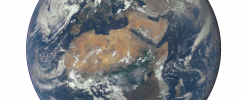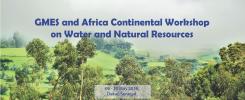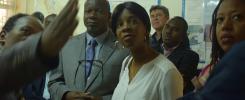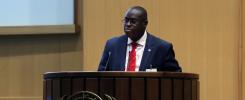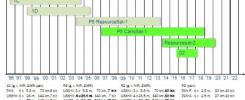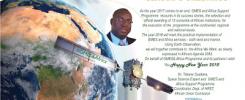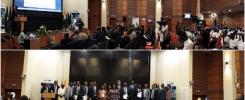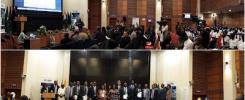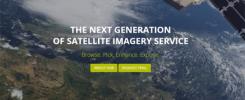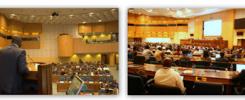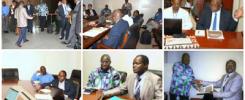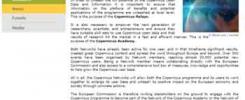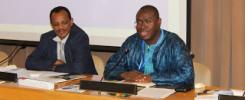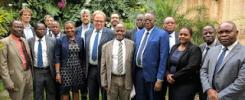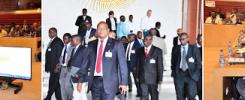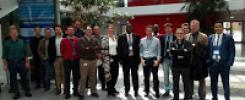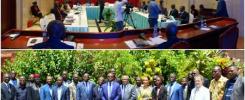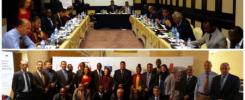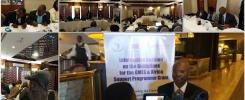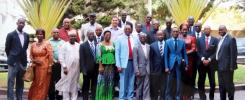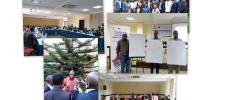GMES & Africa discusses usage and applications of Copernicus Data
19 February 2018
Experts from Africa and Europe discusses how the Global Monitoring of Environment and Security & Africa Support Programme can adapt and use Earth Observation data from Sentinel satellites.
The discussion is going on in a workshop organized by the Copernicus and the GMES & Africa programme for the upcoming three consecutive days (19-21 February 2018) in Accra, Ghana.
About GMES and AFRICA
The Presentations of the event
Day 1
Day 2
Day 3
GMES &Africa Support Programme is the African Union Commission’s Earth Observation flagship programme and the key component of the EU-AU Partnership (Lisbon, 2007) in the space sector. The workshop exchanges views regarding the implementation and adaptation of the COPERNICUS programme in Africa through the development of the African EO services and applications tailored to African needs at continental, regional and local level.
The active collaboration between the two programmes is an essential element of the EU-AU Partnership. The meeting brought together experts from GMES & Africa Support Programme management, GMES & Africa Consortia and European and COPERNICUS Institutions (GROW Copernicus units, DEVCO, JRC, ESA, EUMETSAT, CLS, Mercator, ECMWF).
About GMES and AFRICA
The GMES and Africa Support Programme is a 30 million Euro joint programme co-financed by the European Commission and the African Union Commission. The Programmes uses and adapt the Copernicus Programme data and services to the African context. It is designed to specifically respond to African needs with respect to services related to water, natural resources, marine and coastal areas and to address the global needs to manage the environment, mitigate climate change and ensure civil security. It is to enable the implementation of the African Space Policy and Strategy, formulated to harness the continent’s capabilities in utilizing space science and technology for economic growth and sustainable development. In the implementation agreement, the African Union Commission is the ‘delegated authority’ responsible for the management of the programme.
GMES and Africa Programme aimed at improving African policy-makers’, planners’, scientists’, business and private sector and citizens’ capacities to design, implement, and monitor national, regional and continental policies and to promote sustainable management of natural resources through the use of Earth Observation data and derived information.
GMES and Africa introduced several key innovations: for the first time, with the inclusion of the North African countries, the Programme is pan African. It is totally managed by the African Union Commission, through the Human Resource, Science and Technology (HRST) Department. It engages the African private sector and national and regional academia.
The Presentations of the event
Day 1
- General Overview of Copernicus, Mr Michel MASSART, DG GROW
- The Copernicus User Uptake strategy, Mr Christophe ROELAND, DG GROW
- GMES and Africa Support programme, State of Play and Key findings from the GMES & Africa Due Diligence exercise (EO questionnaire), Mr Brice MONTFRAIX, Technical Assistance Team to the GMES and AFRICA Support Programme Unit.
- AGEOS Gabon, Développement et consolidation des thématiques relatives au service Eau et Ressources Naturelles en Afrique centrale, Mr Michel NGUI ONDO
- CICOS RDC, Gestion de l'Eau et des Ressources Naturelles, Mr Georges GULEMVUGA
- CSE Senegal, Sustainable Wetland Management for Enhancing Food Security and Ecosystem Resilience in West Africa, Dr Ba & Dr SARR
- CSIR South Africa, Marine and Coastal Service Development for Southern Africa (MarCoSouth)
- ICPAC Kenya, Monitoring Natural Resources and Food Security in East Africa Region, Mr Eugene Kayijamahe & Mr Daniel Waiswa
- MOI Mauritius, Marine and Coastal management in the East Africa Region, Dr. B. A. MOTAH
- NARSS Egypt, Developing an Earth Observation Operational Application for Coastal Ecosystems Mapping, Monitoring and Assessment of the Northern African Coastal Zone (NAfCoast), Prof Islam Abou El-Magd
- CSSTE Nigeria, Multi-scale Flood Monitoring and Assessment Services for West Africa (MiFMASS), Dr. Ganiy I. Agbaje
- OSS Tunisia, Supporting the sustainable management of water and natural resources through the valorization of Earth Observation (EO) data and technologies
- RCMRD Kenya, GMES & Africa Support Programme, Land Degradation Monitoring and Assessment, Wetlands Monitoring and Assessment and Open Geographical Regional Reference Vector Database (~1:1M scale) for water and agro-ecological zonings , Mr Degelo Sendabo
- SADC Botswana, GMES and Africa, Southern Africa THEMA: Water and Natural Resources Applications, Mr Thembani Moitlhobogi
- SASSCAL Namibia, Wetland Assessment and Monitoring Platform for Transboundary River Basins in Southern Africa (WeMAST), Mr Casper BONYONGO
- University of Ghana, Marine & Coastal Areas Management in Western Africa, Prof. George WIAFE
Day 2
- EC-AUC Cooperation Arrangement: Data access and use of Sentinel data, Mr Christophe ROELAND, DG GROW
- Copernicus Sentinel Data Access: Africa Hubs – Analysis, Requirements & Protocol, Mr Benjamin KOETZ, ESA
- GMES Africa, Data Access and User Service, Mr Vincent GABAGLIO, EUMETSAT
- Copernicus Global Land Service, Mr Marco CLERICI, JRC, Bruno Smets, VITO, and Lionel Zawadzki, CLS
- Copernicus Marine Service in support to GMES & AFRICA, Dr. Fabrice Hernandez, IRD/LEGOS/Mercator Ocean
- The Copernicus Atmosphere Monitoring Service, Mr Jean-Noel Thepaut, ECMWF
Day 3
- The Copernicus Climate Change Service, Mr Jean-Noel Thepaut, ECMWF
- The Copernicus Emergency Management Service, Mr Peter SPRUYT, JRC



